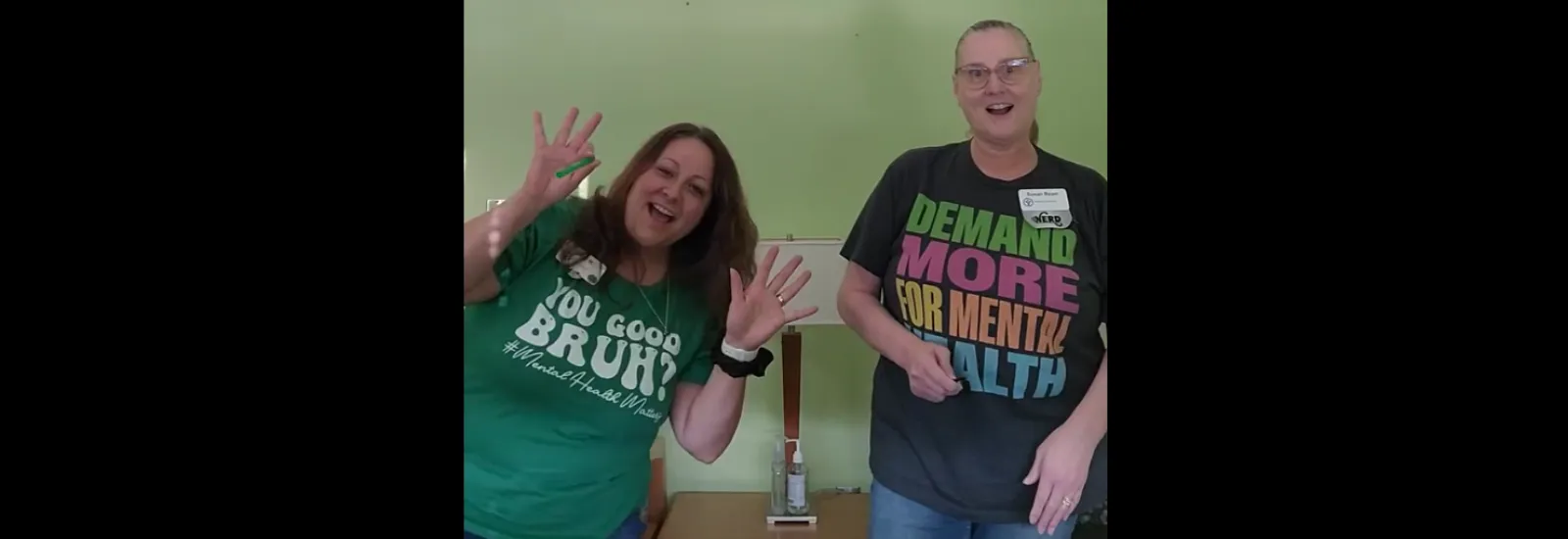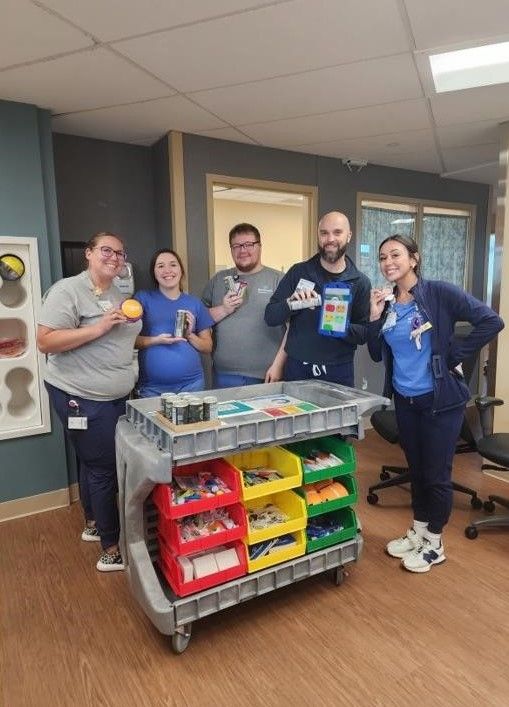
Unique in-house mental, emotional health services combined with leadership support bring standout change
Reid Health is deeply committed to the mental, emotional, and
physical well-being of its team members. Prioritizing employee wellness not
only enhances individual health but also strengthens staff retention and
improves patient care.
Driving this effort are two key departments: the Employee
Assistance Program (EAP) and the Nurse Excellence, Resilience & Development
(NERD) department. Together, they're developing innovative strategies to reduce
stigma, prevent burnout, and foster a culture of support across the
organization.

At the center of this work are Susan Ream, Nurse Well-Being
Education Specialist with NERD, and Tanja McFarland, Lead Counselor with EAP.
Their close partnership — rooted in years of collaboration — has helped shape a
unified, holistic approach to employee wellness and created a friendship that
fuels their shared mission.
Ream and
McFarland first bonded working together in EAP.
"We've always been close, but I think that
just kind of cemented us doing the initiatives and EAP," Ream said.
Together, they've
led macro-level trainings on conflict resolution, nurse hostility, and voice
training. They've presented at new employee orientations, facilitated
team-building exercises, and led departmental meditation. EAP continues
offering department-specific training.
After five
years with EAP, Ream became Director of Inpatient Psychiatry. Her role shifted
again during the COVID-19 pandemic when the unit was temporarily converted to a
medical-surgical unit. It was then she began rounding to support staff
directly.
During that
time, she attended the National Nurse Well-being Conference, where she was
inspired to propose a new staff support role. She helped draft a job
description to formalize it as a position that remains unique and is still
evolving a year later.
"I thought,
'This is what I want to be when I grow up,'" Ream said. "I was able to slide
into my role, and it's still a work in progress, it's fair to say. I'm still
figuring it out as I go."
The Unicorn:
Reid's Employee Assistance Program receives MHA Bell Gold Seal
Reid's EAP
offers free, unlimited mental health therapy and support to employees and their
household dependents. McFarland and David Hill, EAP Counselor, provide those services.
"Reid is a
unicorn when it comes to that because right now (as part of) the benefits, they
see licensed clinical professionals at no charge to them at all," Ream said.
Reid's EAP was
recently awarded the 2025 Mental Health America (MHA) Gold-certified Bell
Seal, the nation's top certification for mental health in the workplace.
Reid earned a total score of 85%, with strong marks in workplace culture,
mental health benefits, care beyond compliance, and holistic wellness.
McFarland said
the gold certification took three months to complete. The team is now reviewing
ways to improve and work toward the platinum level.
"It definitely
brings pride that our organization is willing to take the steps to make sure
mental health is just as important as our physical health," McFarland said.
"It's all attached."
She emphasized
the importance of viewing mental, emotional, and physical health as
interconnected, though mental health often remains overlooked.
"I appreciate
Reid is making holistic health a priority and sees positive changes already
happening," McFarland said. She noted the organization's openness to progress,
such as offering more continuing education (CEUs) for medical staff, and she
remains hopeful about future developments.
For Ream,
whole-person care is key and she believes Reid is on the right path.
"After
receiving this, we want to look at our initiatives again, try to see what our
next step would be, try to hit that platinum level. That's the top level -- that
next step up -- and if we could do that," McFarland said, "that would be
great."
The Bell Seal
recognition has inspired continued improvement. McFarland said Reid supports
mental and emotional health through internal promotion and referrals from HR
and team leaders, all while respecting individual privacy.
Reid's EAP
differs from the traditional model, which often acts only as a referral service
after a brief intake and offers a few short-term sessions. Reid's model
emphasizes ongoing support, leadership development, and team building.
McFarland will
celebrate 19 years at Reid in July. She started as a discharge planner, later
moved to inpatient psychiatry, and then became an outpatient therapist. She
joined EAP in 2013.
Ream said
McFarland's diverse skill set and specialty training are "multi-dimensional."
Both hope to
see continued growth in mental, emotional, and physical health support.
"Especially
with the rise of mental health recognition and inclusion," McFarland said.
Caring for
the Caregivers: Pioneering
a role with a mission to support, retain, and empower nurses
Reid's one-of-a-kind Nurse Well-Being Education Specialist is a relatively
new role created because the organization recognized its necessity.
"To my
knowledge, I'm the only one in the state," Ream said. "We're the only
organization that does this and has specifically a licensed trauma therapist
doing it. Typically, this type of role is more nursing based."
Ream, a
licensed social worker, will be at Reid for 18 years this October. She started
her career as an outpatient therapist before moving into inpatient psychiatry.
As the Nurse
Well-Being Education Specialist, she focuses on strengthening the emotional
well-being and resilience of inpatient nursing teams. Her day-to-day work
includes wellness rounding, code debriefings, and monthly mental health
training in partnership with the EAP. She also provides practical strategies
for managing emotionally intense situations.
Ream is
currently participating in a national nursing well-being initiative with the MedStar
National Nursing Well-being Consortium and Georgetown University in Baltimore,
Maryland. Her efforts are already making a significant impact.
Her initiatives
include Mental Health Monday #BrainMassage, an internal video series for staff.
She's also weaving resilience strategies into department rounds and educational
programs. These efforts reflect a broader culture shift that places mental
health, emotional resilience, and physical fitness at the center of care.
Monthly mental
health initiatives are supported by funding from the Reid Health Foundation.
Her passion is
rooted in her original calling to social work and helping others. Investing in
caregiver well-being directly improves patient care, boosts team confidence,
and enhances job satisfaction.
Post-COVID,
Ream said many bedside staff exhibit symptoms of trauma or stress, even without
formal PTSD diagnoses. She stressed the importance of supporting staff in a
time when nursing shortages and high turnover persist.
"We don't want
to lose the people we have. We want to make sure they stay at their peak —
emotionally, socially, physiologically," Ream said.
She and
McFarland are proud to play a part in that support.
"I think
healthcare in general is beginning to recognize the importance of well-being
when it comes to teams," Ream said.
They're still
early in the process, but the goal is to reduce call-ins while increasing
retention, she added. The national average for turnover is about 18%, and the
healthcare system's goal is to be below that percentage.
"I'm just the
beginning of that," Ream said. "I know that's primarily what I'm tasked with
over the next couple years — to provide that and hopefully offset turnover."
Small Team, Big
Impact: Refilling buckets through connection, care, and power of being seen
A highlight of Ream
and McFarland's work is continuing to collaborate.
"She is
amazing," McFarland said. "We definitely, I think, can become a good duo for
sure."
They've worked
to make training more engaging — even when the topics are "dry" — and to
increase visibility across a large, decentralized system with only two EAP
counselors.
Despite the
challenges, meaningful moments keep them going.
"Perfect
example I can give is this weekend. My daughter and I went to the farmers market…and
I had two nurses come up and tell my daughter her mom helped save their life," Ream
said.
"Because she
sees how the community responds to her mom, she's going into social work," McFarland
added.
"That was
really touching to me," Ream said. "Those five minutes refilled my bucket for
another month, a year."
Often, they
don't know if their efforts have helped unless someone chooses to share.
"You just don't
know if you really help someone," McFarland said.
They
acknowledge the stigma around mental health — especially when counselors are
also colleagues.
"Sometimes with
how our job is, you work with whom you serve. That can become very difficult — blurred
lines — and you could see someone next to you. I'm in meetings with them. It's
keeping that separation," McFarland said.
They also
prioritize their own well-being and regularly support one another.
For McFarland,
self-care includes family time, nature, and solitude.
Their efforts
are paying off. They've seen improvements in retention and patient
satisfaction. They're also increasingly called to debrief after difficult
events.
Though Reid's the
smallest hospital system in the MedStar consortium, they're collecting
comparable data. Ream is adapting MedStar's large-scale model to fit a smaller
setting here with just herself, two EAP counselors, and a full-time chaplain.
She plans to
present Reid's data at the national consortium next May. The goal, she said, is
to show well-being programs can be prioritized and implemented regardless of
system size and no matter the resources available.
Also, Reid is
evaluating how it tracks turnover — whether someone left for personal reasons
or because of dissatisfaction — and the true costs of retraining.
For now, Reid's
cultivating a culture is grounded in a commitment to holistic, team-focused
care — where emotional, mental, and physical well-being are treated with equal
importance.
The close
collaboration between Ream and McFarland exemplifies how trust, innovation, and
shared purpose can transform workplace wellness.
Together, they're supporting individual caregivers and a cultural shift that recognizes well-being as essential to retention and quality patient care. Their partnership continues to model what's possible when leadership, empathy, and clinical expertise combine in service of healing the whole person.

